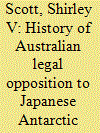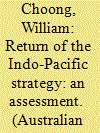|
|
|
Sort Order |
|
|
|
Items / Page
|
|
|
|
|
|
|
| Srl | Item |
| 1 |
ID:
168379


|
|
|
|
|
| Summary/Abstract |
Whaling has been a consistent theme in Australia’s relations with Japan since the 1930s, Australia having endeavoured to regulate, restrict, or bring to a complete halt Japan’s Antarctic whaling virtually since it began. Australia’s motivations have been mixed, involving at various points, some combination of protection of Australia’s coastal whaling industry, concern for Australia’s security, for safeguarding Australia’s Antarctic territorial claim, and more recently, concern for Australia’s whale-watching industry and/or for the whales. Since environmental consciousness became a primary factor in the 1970s, Australian policy has been aligned with that of anti-whaling non-governmental organizations (NGOs), albeit that certain actions of NGOs have caused difficulties for the Australian Government. Law – inclusive of legal argument in the course of diplomacy, domestic laws, and international litigation – has been a mechanism of influence used by the Australian Government and NGOs. This paper traces Australia’s legal opposition from its beginnings until Japan’s announcement in December 2018 that it would end Antarctic whaling.
|
|
|
|
|
|
|
|
|
|
|
|
|
|
|
|
| 2 |
ID:
168378


|
|
|
|
|
| Summary/Abstract |
This article examines why Asia-Pacific middle powers cooperate with each other on security issues. The article challenges the assumption that middle powers are primarily influenced by great-power structural factors in their security relations with each other. It argues that the dominant structural explanations of security cooperation between secondary states—balancing against the rise of China, responding to burden-sharing pressure from the United States, or hedging during a period of great power transition—have not been sufficiently tested. Using the 2009 Australia-South Korea security cooperation agreement as a representative example of middle power security cooperation, it finds that inter-personal leadership preferences played a key intervening role in filtering existing structural incentives into actual policy cooperation. It shows how congruence in leadership preferences shapes when and with whom middle powers are likely to cooperate on security issues. The article opens up the research agenda on middle powers by examining how they approach security relations in bilateral and horizontal contexts with each other.
|
|
|
|
|
|
|
|
|
|
|
|
|
|
|
|
| 3 |
ID:
168380


|
|
|
|
|
| Summary/Abstract |
Given current emissions trends an increase in global temperatures in excess of 2°C is highly likely in the coming century. In this context, it seems increasingly probable that states may consider solar geoengineering as a stop-gap climate response. Solar geoengineering refers to measures that aim to alleviate some measure of global warming by intentionally increasing the amount of the sun’s energy that is reflected into space. Currently the two most discussed solar geoengineering techniques involve either marine cloud brightening or dispersing aerosols in the stratosphere. These techniques could be relatively inexpensive, are within the technological capacities (after a brief period of development) of technologically-advanced countries, and could have an almost immediate impact on temperatures. Yet, while solar geoengineering might potentially be utilised to manage some climate-linked security threats, it itself would create new security challenges. Consequently, this paper explores potential international security implications for Australia if a regional state, or group of states, initiates a solar geoengineering program. We conclude that since solar geoengineering is unlikely to become a first-order international issue, disputation over solar geoengineering will likely reflect, or act as a proxy for, wider patterns of state interaction. However, scenarios in which China and the United States take different positions, or in which there are divisions among regional powers, such as Indonesia, Malaysia, India and Singapore would pose the greatest threat to Australia’s national security.
|
|
|
|
|
|
|
|
|
|
|
|
|
|
|
|
| 4 |
ID:
168376


|
|
|
|
|
| Summary/Abstract |
Eleven years after it was abandoned, the so-called Indo-Pacific concept is back with a vengeance in regional security debates. At the 2017 Shangri-la Dialogue, there were only five mentions of the ‘Indo-Pacific’ at the annual defence ministerial forum. In the following year, the figure had jumped to 92. The Indo-Pacific Four countries promoting the ‘free and open Indo-Pacific’ (FOIP) concept share many principles, including freedom of navigation and overflight, connectivity and economic growth, and respect for the rule of law. There are, however, clear points of divergence between them, such that there are actually different Indo-Pacific strategies among the Indo-Pacific Four. Even if the Indo-Pacific Four manage to resolve these issues (and the possibility of this is low), it is not likely that ASEAN would endorse the FOIP concept. The reality remains that Indonesia and ASEAN have taken a different approach to the Indo-Pacific. The ASEAN approach is to appropriate elements of FOIP strategy which are more attractive to ASEAN (for example, connectivity and infrastructure), yet reject elements of FOIP strategy which ASEAN deems inappropriate (the exclusion of China and the loss of ASEAN centrality). This does not augur well for the adoption, in its entirety, of the FOIP concept by ASEAN.
|
|
|
|
|
|
|
|
|
|
|
|
|
|
|
|
| 5 |
ID:
168377


|
|
|
|
|
| Summary/Abstract |
Faced with an increasingly authoritarian and assertive China, the United States (US) under President Trump administration’s has embarked on a course toward a more openly competitive US–China relationship. However, the debate in Australia has viewed the new era of US-Sino strategic competition mostly negatively. Indeed, arguments have been made for a need to ‘radically’ rethink Australia’s defence policy in order to prepare for a ‘post-US-led’ regional order. For some analysts, Canberra has even no other choice than to adopt a strategy of ‘armed neutrality’ to deal with an emerging China-dominated regional order and a declining US, confused and unwilling to defend its allies. In contrast, this article argues that on balance Trump’s course correction on China is positive for Australia as the US is likely to maintain its robust engagement in the Indo-Pacific. While the president’s inconsistencies partly undermine US declaratory statements in regards to greater competition with China, a bipartisan consensus is likely to continue to shift US policy in this direction. While greater US-Sino competition requires Australia to assume greater responsibilities for regional security, radical changes to its defence policy and security alignment are not needed.
|
|
|
|
|
|
|
|
|
|
|
|
|
|
|
|
|
|
|
|
|